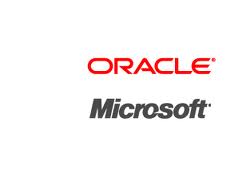As the saying goes, it’s hard to tell the players without a scorecard. Microsoft, cloud ERP provider NetSuite, and SaaS (Software as a Service) CRM provider Salesforce are all shaking hands with leading database vendor Oracle. For Salesforce, this follows their trend of being easily integrated within any software, such as Vertify (click here to find out more) and continue to grow at a rapid pace. In Microsoft’s case, it’s a little surprising because their SQL database product is considered a direct competitor of Oracle’s and Netsuite can be considered a competitor of Oracle’s JD Edwards ERP. What’s going on?
There are two common reasons for such alliances: a common approach to meeting a market’s needs, and forming an alliance to address a threat by a competitor. Amazon AWS has been mentioned as a possible competitor here. EMC and VMware, already closely tied, have produced Pivotal, a Big Data operation and platform provider. GE has bought a stake in Pivotal, and the drums of war do seem to be sounding in the distance.
There is some confusion here: Microsoft’s Azure is IaaS (Infrastructure as a Service) as is Amazon’s AWS, Pivotal is offering Paas (Platform as a Service), and other players are offering SaaS products. This turns the battlefield of competition into more of a chess board, where various pieces of the cloud-based picture are moving to position themselves relative to the new market. Likewise, in this model customers from multinationals to SMBs are buying services rather than hardware, and providers are building services upon platforms upon infrastructure.
Microsoft’s Azure IaaS couldn’t compete head-to-head because it was the odd man out: it didn’t offer the Oracle database common denominator. That has changed, moving the chess pieces around again. At the ERP level, including CRM and other independent pieces, there are still some challenges. Even there, Oracle and NetSuite Partners are working ever more closely together. For some reason, a Salesforce speaker was dropped from the keynote position at a recent Oracle OpenWorld conference, prompting suspicions that alliances were being declared.
There are some unresolved questions as the players make their moves, leveraging their positions as infrastructure, platform, and software leaders. At all three “layers,” there seems to be homogenization, fulfilling the cloud vision of a utility-like offering which companies can buy in metered amounts.
Even at the software level, presented as ERP offerings, software components allow easy object-based data transfer between major providers. It appears that the market is aligning itself very much after the electricity or phone service model, particularly the long distance telephone service model which pitted Sprint against MCI against AT&T and many others offering basically the same product.
CIOs have had to face the “vendor lock-in” versus “standards-based” question repeatedly and the market has swung back and forth over time. Generally, IT strategists seem to dislike lock-ins. Is the current market heading towards a standards-based stack of providers, or will there be a breakout at some point where differentiation takes place? Just as phone customers hopped from one long distance provider to another at will, will companies be able to do that for their ERP services?
Oracle’s alliances with Microsoft, NetSuite and Salesforce seem to point towards some commonality in industry offerings, with questions still remaining.
Further reading:
http://www.domain-b.com/companies/companies_o/Oracle/20130622_salesforce.html
http://www.pcworld.com/article/2036305/pivotal-launched-from-vmware-emc-technologies.html
http://www.zdnet.com/oracle-databases-head-to-microsofts-hyper-v-azure-7000017226/
Author Bio:
Patrick McTosh has deeply immersed himself into the IT world over the past decade. From his early days tinkering on his own sites, to his Computer Science Engineering days at McGill University, Patrick has had his own successes as a small business owner and freelancer, and now passes on his success to other small business owners as a consultant.

